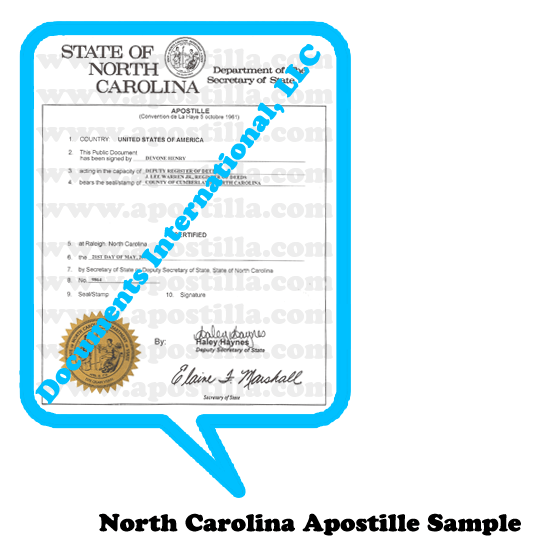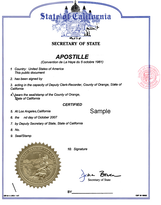Recognizing the Apostille Refine: A Comprehensive Overview to International File Verification
Browsing the intricate landscape of worldwide record authentication can be daunting without a clear understanding of the apostille process. This overview diligently outlines the required actions, from recognizing which records require accreditation to sending them for confirmation by the Competent Authority. Realizing the importance of an apostille and recognizing potential mistakes, such as insufficient entries and language obstacles, can dramatically streamline the authentication journey. What precisely defines an apostille, and why is it so essential for files destined for Hague Convention countries? These concerns develop the foundation of our exploration into this vital legal procedure.
What Is an Apostille?
An apostille is a main qualification that confirms the authenticity of a file for use in another nation. This qualification, provided by an assigned authority in the country where the record stemmed, makes sure that the paper is acknowledged as valid and reputable in the global field. The process of getting an apostille includes a number of actions, including the confirmation of the record's signatures, seals, and stamps by appropriate governmental bodies.
The apostille functions as a worldwide acknowledged form of verification, made possible by the Hague Convention of 1961. This treaty, formally referred to as the Hague Convention Abolishing the Need of Legalisation for Foreign Public Files, standardizes the procedure of document qualification among participant countries. The apostille itself is a standard certificate which contains details info, such as the releasing authority, the native land, and the date of issuance.
It is essential to keep in mind that not all documents are qualified for an apostille. Usually, public documents like birth certifications, marital relationship licenses, court orders, and academic diplomas get this accreditation. Exclusive files, such as agreements and agreements, might call for notarization and added steps to qualify.
Relevance of Apostille
Understanding what an apostille is establishes the phase for appreciating its relevance in international negotiations. houston tx apostille. An apostille, basically a form of accreditation released by a designated authority, verifies the credibility of a document for use in international countries that are signatures to the Hague Apostille Convention. This standard process gets rid of the demand for further legalization by embassies or consulates, therefore simplifying international transactions
It guarantees the integrity and approval of necessary records-- such as birth certifications, marital relationship licenses, and instructional diplomas-- throughout borders. For companies, it helps with the smooth conduct of worldwide trade, mergers, and acquisitions by giving a relied on approach of paper confirmation.
Additionally, an apostille improves legal safety and compliance. Governments and institutions can with confidence depend on the authenticity of documents birthing an apostille, minimizing the danger of scams and misrepresentation. Hence, the apostille acts as an important tool in promoting international teamwork and count on. Its role in cultivating effective and secure global deals underscores its indispensable worth in today's interconnected world.
Files That Call For Apostille
When participating in worldwide purchases or legal matters, details documents commonly necessitate the authentication supplied by an apostille. This guarantees their recognition and acceptance in nations that are signatures to the Hague Apostille Convention. Typically, individual records such as birth certifications, marriage certificates, and fatality certifications call for an apostille, especially when they are used for processes like immigration, marriage abroad, or international probate matters.
Educational papers are an additional group frequently requiring apostilles. Diplomas, transcripts, and academic records commonly require this verification for purposes such as pursuing further education, employment, or expert licensing in a foreign country (houston tx apostille). This step ensures that the papers are acknowledged as reputable and legitimate
Lawful records, consisting of powers of lawyer, testimonies, and court orders, additionally generally demand apostilles. Organization records such as certifications of unification, laws, and business agreements may need an apostille to help with international trade, develop international branches, or involve in cross-border lawful procedures.
Steps to Obtain an Apostille

Obtaining an apostille entails a multi-step procedure that makes certain the credibility and acceptance of your files in foreign countries. you can try here The first action is determining which files need an apostille. houston tx apostille. Typical documents consist of birth certifications, marriage licenses, scholastic records, and company papers
When determined, the document has to be licensed by the suitable issuing authority. This could include notarization by a notary public or confirmation by a regional or state official, relying on the kind of file. After certification, the paper needs to be submitted to the designated Competent Authority in the record's country of beginning. In the United States, as an example, this is typically the Assistant of State's office for each and every state.
The submission procedure usually calls for a completed application type, the initial file, and a cost. Some jurisdictions might offer the choice of expedited handling for an extra cost. Upon successful verification, the Competent Authority will certainly affix the apostille certificate to the record, thus validating its authenticity.
Common Obstacles and Solutions
Browsing the apostille process can provide numerous common difficulties that, otherwise properly dealt with, might postpone or complicate file verification. One constant concern is the submission of inaccurate or insufficient records. Each country has particular demands for the kinds of records that can be apostilled, and any kind of discrepancy from these can lead to being rejected. Making certain that all documents are accurate and total before entry is critical.
Another common obstacle is recognizing the varied processing times. Handling times can vary significantly in between countries and also between different regions within the same country. It is vital to represent these variations when planning the apostille procedure to prevent unanticipated delays.
Furthermore, language barriers can pose significant barriers. Records in a foreign language usually call for licensed translations, and any type of errors in translation can bring about further issues. Engaging a specialist translation solution can alleviate this danger.

Final Thought
Grasping the apostille procedure substantially improves the efficiency see post of global document verification. By understanding the requirement of identifying and certifying required papers, and navigating the entry to the try this site Competent Authority, the procedure comes to be much more manageable.